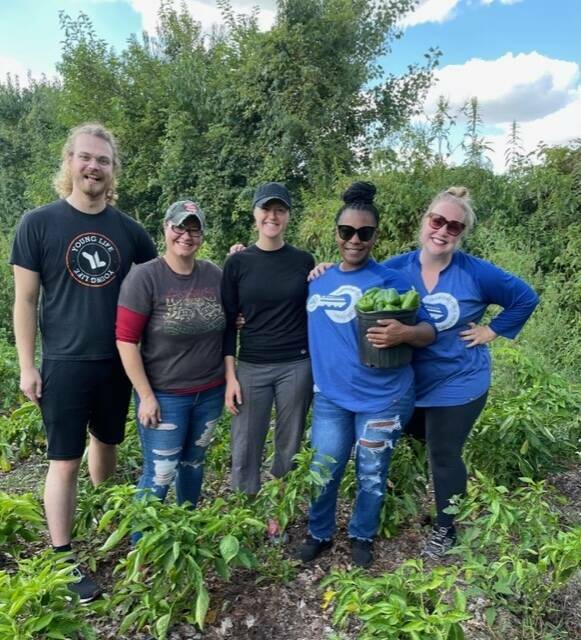
As we gear up for the holidays and reflect on the things we are thankful for, a remarkable collaboration unfolds that brings together the essence of gratitude, family, community, and respect for the Earth. At the heart of this synergy are mother and son duo, Jan Pilarski and Chris Tidmarsh, the visionary minds behind Green Bridge Growers. Their profound impact extends beyond the fields they cultivate, reaching the very core of our culinary celebration. This Thanksgiving, our award-winning pastry team, led by Three Leaf Executive Pastry Chef Sinai Vespie, transforms Green Bridge Growers' pumpkins into exquisite desserts. The rich flavors of pumpkin cheesecake at Rohr's and the delightful pumpkin tarts at Cafe J embody the spirit of the season, offering a taste of gratitude from farm to table.
Guests can enjoy the desserts in Cafe J the week leading up to Thanksgiving, and in Rohr's as the featured dessert on the Thanksgiving menu.
Green Bridge Growers: A Force for Good
The journey to becoming sustainable farmers was far from conventional for Tidmarsh and Pilarski. Equipped with degrees in chemistry, environmental studies, and French, Tidmarsh encountered the stark reality of navigating the workforce as a young adult with autism and the lack of program development tailored for individuals within the spectrum.
In response to these formidable challenges, Tidmarsh and Pilarski took proactive measures, seizing the initiative to develop a groundbreaking concept. Their vision centered on employing innovative farming methods to cultivate fresh produce year-round, all while fostering a supportive work environment specifically designed for young adults with autism. And so in 2013 Green Bridge Growers was founded.
The Seeds of a Responsible Production
As Tidmarsh and Pilarski embarked on a journey of extensive research in collaboration with a start-up incubator at the University of Notre Dame, they explored a myriad of farming methods. In the course of this exploration, aquaponics emerged as a standout solution to address many of the environmental challenges inherent in traditional agriculture. This innovative, soilless method facilitates the coexistence of plants and fish, boasting a remarkable reduction of approximately 90% less water consumption than conventional farming. The fish play a pivotal role by naturally fertilizing the plants through their excreta, thereby eliminating the need for chemical fertilizers and establishing a sustainable closed-loop system. Yet, Tidmarsh's commitment to innovation didn't end there.
Driven by the desire to offer a diverse array of produce to local retailers and restaurants, Green Bridge Growers continued to expand and diversify their production methods, tailoring them to be more suitable for cultivating a wide variety of crops.
Among the innovative approaches adopted by Green Bridge Growers, the utilization of unheated high tunnel greenhouses was a key factor in enabling continuous crop production during the frigid winter months in Northern Indiana, all achieved without the reliance of their solar energy resources which power the rest of their operations. This accomplishment is a testament to Tidmarsh and Pilarski's in-depth understanding of crop seasonality. Their expertise allowed them to pinpoint resilient crops like kale, spinach, and collard greens, uniquely suited to withstand low temperatures and, in the process, acquire a distinctive sweetness seldom found in everyday grocery stores, as affectionately noted by Pilarski.
However, Green Bridge Growers isn't solely reliant on innovation and technology. When it comes to many of their crops, they embrace a more traditional approach—working hands-on in the field. Staying steadfast in their commitment to environmental sustainability, Tidmarsh and Pilarski actively engage in a range of regenerative agriculture practices to enhance soil quality without resorting to environmentally harmful chemicals.
Adhering to environmentally conscious practices, Green Bridge Growers employs a diverse set of methods, including low-till farming, the strategic use of cover crops,or even creating compost from discarded leaves in South Bend. Each practice is executed with precision, involving meticulous testing of soil and crop types. This ensures a tailored approach to soil amendment, eliminating the risk of adverse agricultural effects such as soil acidification, eutrophication, and soil erosion.Thus, creating a holistic and environmentally responsible approach to agriculture.
Empowerment Through Opportunity
In addition to their environmental work, Green Bridge Growers actively addresses the employment gap for individuals with autism. By combining training and employment, the farm has provided 40 autistic youth and young adults with valuable skills, preparing them for future employment opportunities. Tidmarsh highlights the strengths of autistic individuals, emphasizing their attention to detail, problem-solving abilities, and commitment to completing tasks. The farm operates on a schedule, promoting consistency and thoroughness, qualities that align well with the strengths of the autistic team members.
Advice for Aspiring Autistic Entrepreneurs
As a seasoned entrepreneur and advocate for autism, Tidmarsh shares valuable advice. He emphasizes the importance of showcasing the capabilities of autistic individuals and putting them at the forefront. Tidmarsh encourages aspiring entrepreneurs to prioritize the highest quality in their products or services, fostering community support for businesses that employ autistic individuals. In essence, he sees entrepreneurship as a means to make a significant difference for many individuals while contributing to a more inclusive and sustainable future.
Originally published by at experience.nd.edu on November 20, 2023.